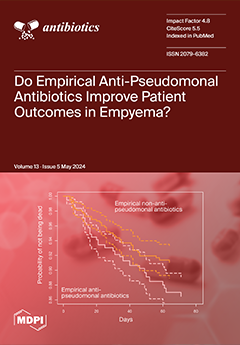Rapid growth in commercial poultry production is one of the major sources of
Salmonella infections that leads to human salmonellosis. The two main
Salmonella enterica serovars associated with human salmonellosis are enteritidis and typhimurium. The aim of this study was to determine the prevalence of
S. enterica serovars Enteritidis and
S. Typhimurium as well as their
Salmonella pathogenicity islands (SPI) and antibiotic resistance profiles in broiler chicken feces from slaughterhouses. A total of 480 fecal samples from broiler chickens that were grouped into 96 pooled samples were identified to have
Salmonella spp. using the
invA gene, whilst the
Spy and
sdfI genes were used to screen for the presence of
S. Enteritidis and
S. Typhimurium serovars, respectively, by polymerase chain reaction (PCR) assays. The isolates were also screened for the presence of
Salmonella pathogenicity islands (SPIs) using PCR. The disc diffusion assay was performed to determine the antibiotic resistance profiles of the isolates. A total of 36 isolates were confirmed as
Salmonella spp. through amplification of the
invA gene. Out of 36 confirmed
Salmonella spp. a total of 22 isolates were classified as
S. Enteritidis (n = 8) and were
S. Typhimurium (n = 14) serovars. All (n = 22)
S. Enteritidis and
S. Typhimurium isolates possessed the
hilA (SPI-1),
ssrB (SPI-2) and
pagC (SPI-11) pathogenicity islands genes. Amongst these serovars, 50% of the isolates (n = 11/22) were resistant to tetracycline and nalidixic acid. Only 22% of the isolates,
S. Typhimurium (13.6%) and
S. Enteritidis (9.1%) demonstrated resistance against three or more antibiotic classes. The most detected antibiotic resistance genes were
tet(
K),
mcr-1,
sulI and
strA with 13 (59.1%), 9 (40.9%), 9 (40.9%) and 7 (31.8%), respectively. The findings of this study revealed that
S. Typhimurium is the most prevalent serotype detected in chicken feces. To reduce the risk to human health posed by salmonellosis, a stringent public health and food safety policy is required.
Full article






